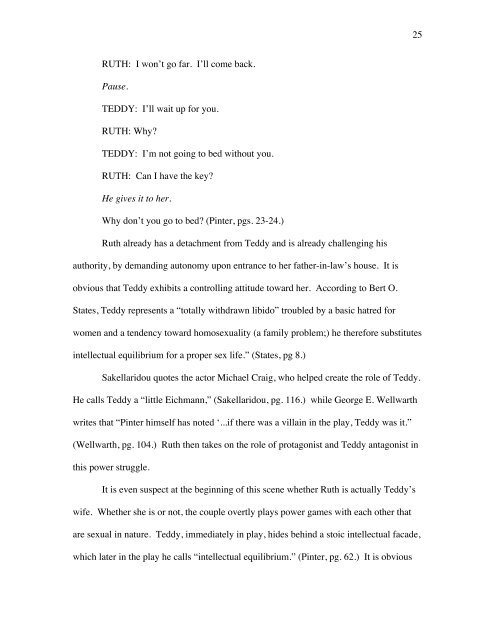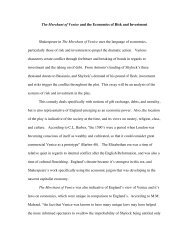You also want an ePaper? Increase the reach of your titles
YUMPU automatically turns print PDFs into web optimized ePapers that Google loves.
RUTH: I won’t go far. I’ll come back.<br />
Pause.<br />
TEDDY: I’ll wait up for you.<br />
RUTH: Why?<br />
TEDDY: I’m not going to bed without you.<br />
RUTH: Can I have the key?<br />
He gives it to her.<br />
Why don’t you go to bed? (Pinter, pgs. 23-24.)<br />
Ruth already has a detachment from Teddy and is already challenging his<br />
authority, by demanding autonomy upon entrance to her father-in-law’s house. It is<br />
obvious that Teddy exhibits a controlling attitude toward her. According to Bert O.<br />
States, Teddy represents a “totally withdrawn libido” troubled by a basic hatred for<br />
women and a tendency toward homosexuality (a family problem;) he therefore substitutes<br />
intellectual equilibrium for a proper sex life.” (States, pg 8.)<br />
Sakellaridou quotes the actor Michael Craig, who helped create the role of Teddy.<br />
He calls Teddy a “little Eichmann,” (Sakellaridou, pg. 116.) while George E. Wellwarth<br />
writes that “Pinter himself has noted ‘...if there was a villain in the play, Teddy was it.”<br />
(Wellwarth, pg. 104.) Ruth then takes on the role of protagonist and Teddy antagonist in<br />
this power struggle.<br />
It is even suspect at the beginning of this scene whether Ruth is actually Teddy’s<br />
wife. Whether she is or not, the couple overtly plays power games with each other that<br />
are sexual in nature. Teddy, immediately in play, hides behind a stoic intellectual facade,<br />
which later in the play he calls “intellectual equilibrium.” (Pinter, pg. 62.) It is obvious<br />
25



